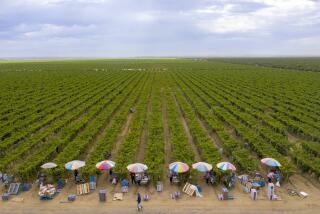State bill would provide funding to police farmers markets
A bill that would for the first time provide adequate funding for catching farmers market cheaters passed the full state Assembly by a lopsided vote on Thursday. If the bill, AB 1871, passes the state Senate and is signed by Gov. Jerry Brown, it will raise an estimated $1.35 million for state and county enforcement efforts.
It will do this by increasing the daily stall fee that the California Department of Food and Agriculture charges certified farmers markets for each vendor, from the current maximum of 60 cents to $2. In a significant change, this would apply not only to farmers but also to markets’ craft and prepared-food vendors, who for the first time would pay directly to help regulate the agricultural core of the markets.
After years of increasing quantity and diluted quality, farmers markets may be at a turning point, and it’s worth stepping back to look at the big picture. Their continued success will depend on customers who take care to distinguish the authentic from the ersatz and to support the finest growers and markets without taking them for granted.
California certified farmers markets have multiplied from 300 in 1999 to more than 800 today, but only relatively few of the more recent markets have thrived the way earlier ones did. Though new markets have expanded opportunities for farmers and shoppers, they have also cannibalized existing markets. Today we have too many markets chasing too few real farmers, at least for some crops.
The farmers who were first to the party have the lion’s share of the best markets; paradoxically, although there are more markets than ever, many promising new growers have trouble getting into good ones because the newer markets are spread too thinly.
The original farmers market model was farmers selling produce directly to the public, but now ancillary financial strategies predominate, and the tail is wagging the dog. Farmers markets and their buzzwords — “fresh,” “local,” “organic” — have become so fashionable that other businesses have cashed in on their cachet. Professional farmers market shoppers buy for customers who don’t have the time. Supermarkets boast of farmers market growers. Restaurants tout their farmers market sourcing.
Business improvement districts and shopping centers use farmers markets to attract customers, and some markets are run by operators whose primary goal is to extract money. Consequently there are more craft and prepared-food vendors, who pay higher fees than farmers. Many markets now can’t survive without such vendors and exist chiefly to secure permitting for their street fair sections, which would be unobtainable without a farmers market component.
Peddlers who resell produce they have purchased elsewhere, not grown themselves, have proliferated at farmers markets. Enforcement by agricultural authorities languished until early last year, when the Los Angeles County agricultural commissioner began a surge that led to more than 40 fines or suspensions for those who did not comply with the state rules. (See the 2014 sanctions below.) A state-funded program this spring is catching even more.
However, though the sales of eggs are regulated, increasing quantities of meat, poultry and dairy are now sold at farmers markets and agricultural authorities are not required to verify that production by the vendor does not match its sales — an unexplained gap in current regulations.
So far this year, the Los Angeles County agricultural commissioner’s office has fined or suspended 19 farms. In two other cases, the county administrative process is complete, but the farm has either pursued an appeal to the secretary of the California Department of Food and Agriculture or still has time to do so.
Clues that tipped inspectors off include the highly technical (such as the presence of pests that are not found in the farm’s growing area) to nearly humorous (one grower was selling produce with commercial stickers that read “product of Mexico”). Most frequently, growers were tripped up simply by selling fruits or vegetables that were not listed on their grower’s certificates.
Some of the infractions took place in 2013, but all were adjudicated by the L.A. County commissioner’s office in the first five months of 2014 — that is, the farm owner agreed to the sanction or did not object within 20 days after being served with a notice of proposed action. (In two cases, the county administrative process is complete, but the farm has either pursued an appeal to the secretary of the California Department of Food and Agriculture or still has time to do so.)
Ed Williams, deputy agricultural commissioner of Los Angeles County, provided the information in response to a request by the Los Angeles Times.
Ana’s Farm (Ming Ho Su, Thanh Viet Truong, owners), Newberry Springs. Fined $600 by Los Angeles County for selling eggs not raised by the farm at the Alhambra farmers market.
Farfan Aurelio, Parlier, Calif. Fined $1,800 and suspended for six months (starting May 1) by Los Angeles County for selling apples and white nectarines not grown by the farm at the West Los Angeles farmers market and for selling Crimson Seedless grapes not grown by the farm at the Wilmington farmers market.
Atkins Nursery (Victor Gonzalez), Fallbrook. Fined $6,000 and suspended for 18 months (to start July 21) for selling oranges it didn’t grow at the West Covina, Claremont and Downey farmers markets, and grapes and tree fruit at the Pomona Valley farmers market; also for selling apples and pitahaya (dragon fruit) at the Baldwin Park farmers market.
Robert Bozzini, Stockton. Fined $401 by Los Angeles County for selling cherries not grown by the farm at the Claremont farmers market.
D&D Produce (Doris Keating and Deborah Polec-Sherk), Fillmore. Fined $401 by Los Angeles County for selling watermelons, cantaloupe and honeydews not grown by the farm at the Brentwood farmers market.
Fresha Farms (Young H. Choi), Lucerne Valley. Fined $401 by Los Angeles County for selling grapes not grown by the farm at the Melrose Place farmers market.
Fruita del Sol (Ryan Metzler), Fresno. Fined $401 by Los Angeles County for selling Crimson Seedless grapes not grown by the farm at the Norwalk farmers market.
Gama Farms (Gerardo and Jessica Gama; Jesus, Betty and Brenda Ayon), Arvin, Calif. Fined $401 by Los Angeles County for selling Crimson Seedless grapes not grown by the farm at the West Los Angeles farmers market.
Garcia Farms (Joel Garcia), Riverside. Fined $401 by Los Angeles County for selling avocados not grown by the farm at the Motor Avenue farmers market. Garcia Farms was also fined $1,200 and suspended for six months (starting July 1) by Los Angeles County for selling blueberries not grown by the farm at the Loyola Marymount University farmers market and for selling grapefruit not grown by the farm at the East Long Beach farmers market.
Manna Orchards (Jin Woo Uh), Madera, Madera County. Fined $1,200 and suspended for three months (dates pending) by Los Angeles County for selling Fuji apples and Asian pears not grown by the farm at the Eagle Rock farmers market.
Moua Tou Por Yia, Selma, Calif. Fined $401 by Los Angeles County for selling large daikon not grown by the farm at the West Hollywood farmers market.
Javier Rodriguez, Selma, Calif. Fined $401 by Los Angeles County for selling celery not grown by the farm at the South Gate farmers market..
South Central Farmers’ Cooperative (Tezozomoc), Buttonwillow, Calif. Fined $401 by Los Angeles County for selling eggplant not grown by the farm at the Watts farmers market.
Frank Thao, Sanger, Calif. Fined $802 by Los Angeles County for selling broccoli and celery not grown by the farm at the Hollywood farmers market.
Brad Tilden, Riverside. Fined $401 by Los Angeles County for selling grapefruit and Oroblancos not grown by the farm at the Whittier farmers market.
V-Floral (Hector and Blanca Venegas), Guadalupe. Fined $1,203 by Los Angeles County for selling blueberries, blackberries and raspberries not grown by the farm at the Temple City farmers market.
Wu Lung-Ke, Arcadia. Fined $401 by Los Angeles County for selling daikon not grown by the farm at the Temple City farmers market.
Xiong Produce (Xiong Vang), Sanger. Fined $1,203 by Los Angeles County for selling zucchini, eggplant and cucumbers not grown by the farm at the Calabasas farmers market.
Yang Produce (Yang Yee), Fresno. Fined $2,005 by Los Angeles County for selling parsnips not grown by the farm at the Pershing Square farmers market and for selling parsnips, romaine lettuce, tomatoes and cauliflower not grown by the farm at the Downey farmers market. Yang Produce was also fined $1,800 and suspended for six months (to start July 1) by Los Angeles County for selling Persian cucumbers, green beans and Chinese eggplant not grown by the farm at the Larchmont farmers market.
More to Read
Eat your way across L.A.
Get our weekly Tasting Notes newsletter for reviews, news and more.
You may occasionally receive promotional content from the Los Angeles Times.










